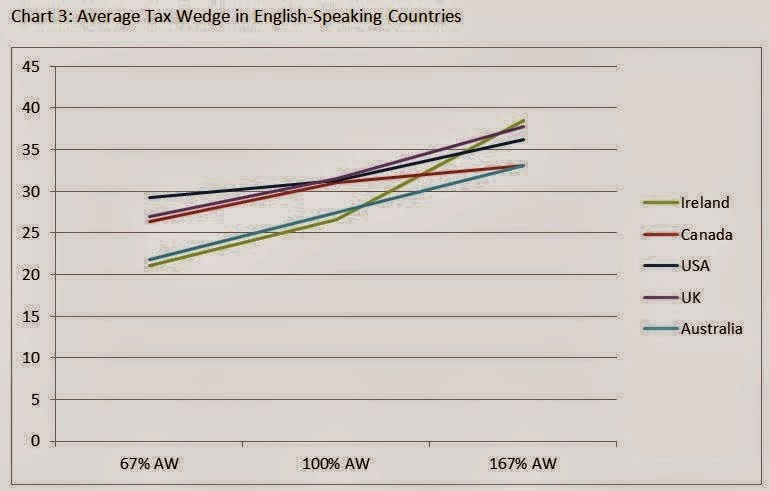We have heard lately from various sources that Ireland has “the most progressive tax and transfer system in the OECD”. This measure refers to Ireland’s income inequality before and after taxes and transfers are taken into account.
But is this a measure of peace or of peacekeepers?
Focus on income tax
The phrase “most progressive tax system” should of course be “most progressive income tax system”. And we know that income tax is not the full picture when looking at a tax system. Taxes such as VAT are regressive and make up about a third of all taxes raised.
The biggest jump
As shown previously, Ireland has the most ‘progressive’ income tax system because it starts with low taxes for those on low and average incomes and ends around average for those on high incomes.
See the following charts:
In all three charts Ireland has the largest ‘jump’ which makes the system mathematically progressive. But does it make the system socially (or economically) progressive?
In Cherishing All Equally we highlighted the need to understand the public services that people receive if we are to fully understand economic inequality. And low taxes are an indicator that we provide fewer public services than are provided in other countries.
Focus on cash
The other way commentators show that the system is ‘progressive’ is to look at income inequality before and after taxes and transfers are taken into account. And indeed, Ireland scores very well. We go from being the most unequal country in the OECD (before taxes and transfers) to around the average.
Income inequality before taxes and transfers (OECD):
Income inequality after taxes and transfers (Eurostat):
The important thing to note is what we are measuring is how hard our system has to work. Ireland is the most ‘progressive’ because we start off as the most unequal. As an IMF staff paper puts it: “More unequal countries tend to redistribute more”.
And once again, the focus on incomes ignores the public services that people need to purchase in Ireland, which could be cheaper or free-of-charge in other countries.
By focusing only on net income inequality without looking at gross, or by highlighting progressivity of our income taxes without understanding the effect on public services, we are ignoring the full context of economic inequality.
It’s a bit like planning a holiday by picking the area with the most peacekeepers.
Cormac Staunton is Policy Analyst at TASC. You can follow him on Twitter @Cormac_Staunton







No comments:
Post a Comment